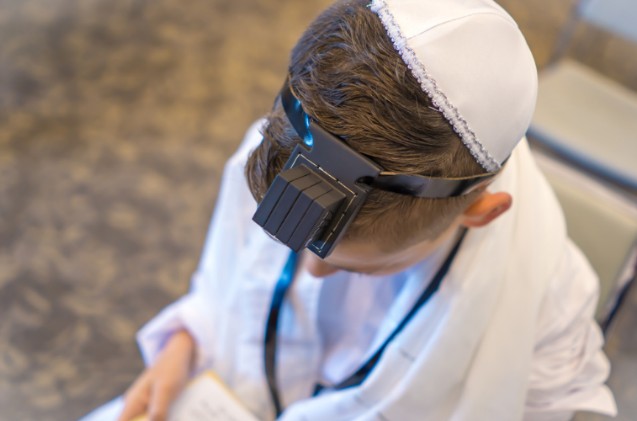Yishai Ben Tzvi: "At My Bar Mitzvah, My Parents Told Me: ‘Your Biological Parents Are Not Jewish’"
Singer Yishai Ben Tzvi always knew he was adopted, but it was only at age 13 that his adoptive parents revealed that his biological parents were not Jewish. Now he had to choose: would he be Jewish or not? In an interview, he explains why he chose to be Jewish and how he fell in love with Hasidic music.
 Singer Yishai Ben Tzvi
Singer Yishai Ben TzviAt first glance, Yishai Ben Tzvi looks like just another average guy wearing a knitted kippah. He's a graduate of 'Bnei Chayil' yeshiva high school, attended a preparatory program, served in the IDF's paratroopers. A religious-Zionist family from Beit Shemesh. Happily married with three adorable small children. He is involved in music, has a band, and recently released his first single from a debut album expected to come out this summer. However, the story of Yishai Ben Tzvi actually begins in Texas, then moves to New York, with the third stop in Israel. Yishai Ben Tzvi grew up in a Jewish adoptive family, but his biological parents were a non-Jewish couple who couldn't raise him. Although he was raised as a Jew in a practicing Jewish family all his life, unlike his friends and everyone else he knew, he chose to be Jewish.
"At my Bar Mitzvah party, there was drama. My parents took me aside and told me: you know you are adopted. What we haven’t told you is that your biological parents are not Jewish. Now that you have reached Bar Mitzvah age, you need to decide if you want to be Jewish or not," Ben Tzvi recounts in an interview with 'Shvi'i'.
It's very heavy to say such a thing to a Bar Mitzvah boy.
"At first, it was a bit traumatic and a dilemma of what to do. Until that very moment, I knew I was adopted but I didn’t know I was the child of non-Jewish parents. The term 'goy' was very foreign to me and not associated with me. It was frightening."
You were given the option to choose.
"It was quite a shock. But after half an hour, I returned to reality. I told them that I am Jewish, it’s clear to me that I am Jewish, and it’s clear to me that I am part of this nation."
Between New York and Texas
Yishai Ben Tzvi was born in Texas, USA, 29 years ago to a non-Jewish couple in their twenties. During the pregnancy, his biological parents realized they couldn't raise him, and the mother searched for an adoptive family.
"Generally, non-Jews adopt non-Jews, and Jews adopt Jews. Here, the situation was different. My adoptive parents, who lived in New York, had been looking to adopt a child for a long time and hadn’t found a suitable match, and my biological family couldn’t find a family they felt comfortable with until a connection was made through an agent. It just happened. I don’t know how. Texas and New York are quite far apart by flight; it’s not like Jerusalem and Be’er Sheva. But they met, and that’s how I came to my family."
Once the details were settled, the adoptive parents waited for the upcoming birth, and two days after Ben Tzvi was born, he was already in his new home in New York. On the eighth day of his life, a brit milah took place. He hasn’t encountered his biological family since. When Ben Tzvi was three and a half, his adoptive parents decided to make aliyah to Israel, and after a year of temporary residence, they settled in Beit Shemesh.
Ben Tzvi always knew he was adopted. However, as a young child, he didn’t truly understand what that meant. "I thought it was a cool thing and told all my friends that I was adopted," he laughs. "My mom recalls that one day in fourth grade, I ran home with a friend and said, 'Mom, tell him it’s true.' She asked, 'What’s true?' I immediately replied, 'That I’m adopted.' She confirmed it, and he was shocked. But I didn’t know until my Bar Mitzvah that I also came from a non-Jewish family."
Do friends know? Do you talk about it, or is it a secret?
"Back then, I kept quiet because I didn’t want people to know. But eventually, it leaked. You know how kids are—they don’t always think deeply about things. Some kids even mocked me, calling me the 'adopted goy'. Here and there, it even led to fights, serious ones, because it hurt me. But I've learned to live with it and accept who I am."
Are there moments when you think that maybe your decision at 13 wasn’t a genuine choice, and perhaps you’d change that decision today? After all, it’s what you knew. To throw everything away and start anew at 13 isn’t really feasible.
"True, there's some truth in that. But I remember asking my dad: what if I decide I want to abandon Judaism and be a non-Jew, what would we do? And my dad said: 'Whatever you want, we’ll do. You don’t have to be Jewish. If you want, you can eat non-kosher and not keep Shabbat. I only ask you to follow the seven Noahide laws. It’s your right. You are our son and will remain our son even if you decide this. So I truly had a choice. But I know that after everything, these are the lives I’m familiar with. Non-kosher food wasn’t something I knew almost at all. I was always Jewish."
 (Illustrative photo: shutterstock)
(Illustrative photo: shutterstock)Okay, but you reach age 18, and you're no longer a young child. Didn’t you have questions or different thoughts, maybe I could have gone a different path?
"Listen, I went through a period of secularism. During high school, I explored different directions. But I went through it. I am Jewish because I accepted upon myself to be Jewish. I can say that when I arrived at the synagogue, there was something that wouldn’t let me see myself as a non-Jew. Maybe I find it tough to keep the mitzvot, but I am Jewish. I wouldn’t have chosen otherwise."
You chose to be Jewish, you chose to enlist in the army, to serve in a combat role. You could have received an exemption. Jewish history and destiny aren’t exactly the simplest things in this world.
"There are no coincidences in the world," explains Ben Tzvi, "I look at my life, and I'm almost 30, and I understand this is the path I had to take. I reached my adoptive family even though my biological parents are from Texas. I was fortunate to be Jewish and come to Israel. I went through quite a lot in the IDF. In the army, I served in the paratroopers, and it was very tough for me. But in the end, I understood that this is the life path Hashem wanted me to go through."
Terrorists at the Northern Border
After the preparatory program in Yatir, he enlisted in the paratroopers and reached Lebanon. There, he encountered terrorists and managed to neutralize two of them. In his view, this was another sign that he is on the right path and that nothing happens by chance. "During the service, I encountered an incident in the Lebanon area with three terrorists with explosive belts, intending to cross the northern border and harm us. I'm not a commando or a great fighter, but I was in the right place at the right time. I happened to come down from the patrol, played around with the night vision binoculars, and spotted terrorists. Two were neutralized. When it happened, I realized my service and the hardships I went through had a purpose. Maybe others' lives were saved because of me. After all, there’s nothing random in this world, and if things unfolded this way, that’s how it was meant to be. I could have been a non-Jew in Texas with a completely different life. But I think I am lucky."
He still hasn’t met his biological parents. One day, he says it will happen. "I haven’t yet looked for them, and I don’t even know their names. People ask me how it can be that I don’t want to search for them? Don’t want to meet them? Not everything I know how to explain. It’s something I haven’t reached yet and haven’t done. Maybe the time has come to look for them. Today, it’s easy with social media. I haven’t reached that stage yet. Together with my wife, I’ve decided that by the age of 30, I will close the circle. I will meet them."
Ben Tzvi not only chose Judaism; he chose Jewish music from the Hasidic music genre. He is releasing an album. He has a band with good friends called 'Rimonim', and he has appeared quite a bit at weddings with the guitar, while also working as a security guard at the Prime Minister's Office. About three years ago, the singer and keyboardist left, and the band was looking for a new singer for the first time, Ben Tzvi realized that he could also sing, and not badly. He put the guitar aside and moved to center stage. "I decided I am going all the way with singing."
And why specifically Hasidic music?
"The ones who connected me to what I do today were singers like Avraham Fried and Mordechai Ben David, whom I heard a lot in my parents’ house," he explains. However, my real musical mentor was Yaakov Shwekey. "When I heard his voice for the first time, I was amazed and said that's what I want."
"I sing in Hebrew, not in Yiddish," he says with a Hasidic twist and smiles. "It's important for me to sing specifically Hasidic music, in Israeli Hebrew. Because this music, which is very popular thanks to singers like Fried, Shwekey, Benny Friedman, and more, and I feel that many of those who love it don’t connect as much because they don’t understand what the words mean – and that’s a shame. I want the religious Zionist community and the secular community to enjoy this music more directly."
Where do you want to go?
"I aim high," says Ben Tzvi. "Hopefully, I’ll succeed in reaching places like Shwekey or Avraham Fried. But let’s say that if I get to half of that, I’ll be happy. It’s important for me to touch people with my music, not just to make a living from it, and I hope to achieve that."
Article courtesy of the weekly "Shvi'i""

